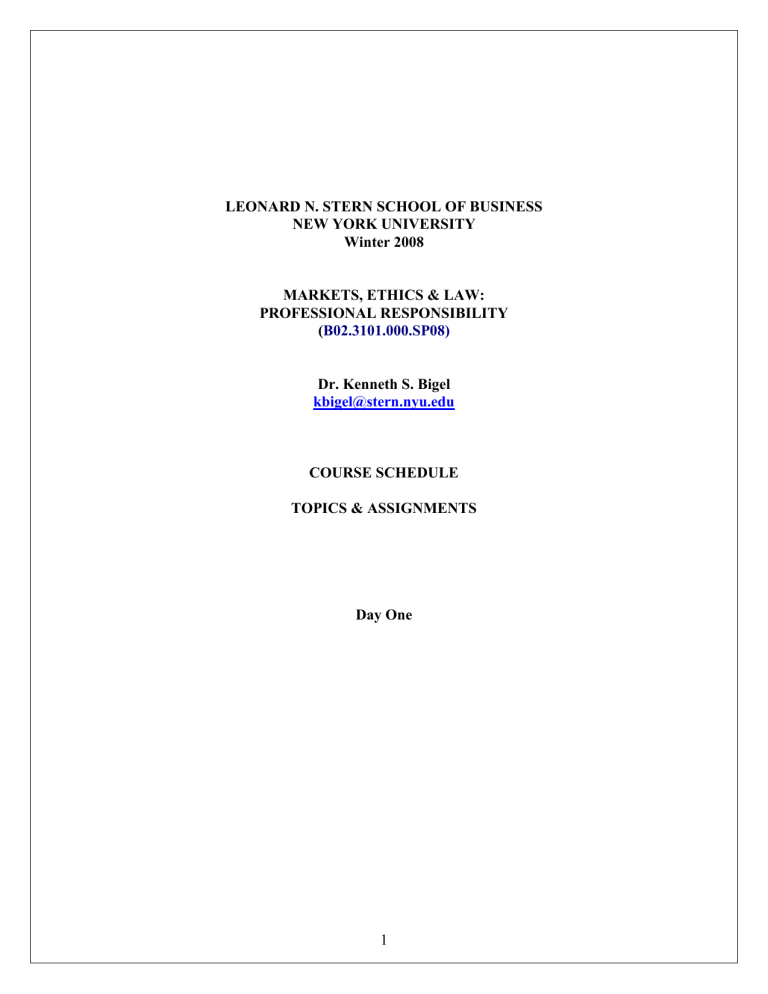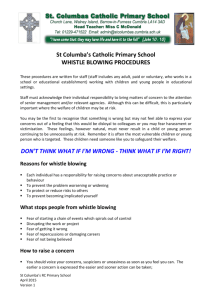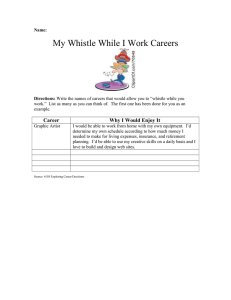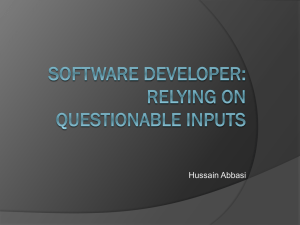LEONARD N. STERN SCHOOL OF BUSINESS NEW YORK UNIVERSITY Winter 2008

LEONARD N. STERN SCHOOL OF BUSINESS
NEW YORK UNIVERSITY
Winter 2008
MARKETS, ETHICS & LAW:
PROFESSIONAL RESPONSIBILITY
( B02.3101.000.SP08)
Dr. Kenneth S. Bigel kbigel@stern.nyu.edu
COURSE SCHEDULE
TOPICS & ASSIGNMENTS
Day One
1
SESSION #1
MARKET FAILURES & PROFESSIONAL DILEMMAS
READINGS Course Pack
Economic Theories of
Regulation: Normative vs.
Positive”
The Price of Lobster
Thermidor
Linda N. Edwards &
Franklin R. Edwards
The Economist http:/www.suboceansafety. org
Dean Starkman
Course Concepts
Moral Standards Across
Borders
Pollution Case Highlights
Trend to Let Employees
Take the Rap.”
Making An Ethical
Decision
Terry Halbert & Elaine
Ingulli
Control By Law
Course Concepts
STUDY QUESTIONS
1. Why do market failures tend to bring about laws or regulations to counter their effects?
2. Based on the Edwards article which market failures or imperfections are present in the
“Lobster Thermidor” (The Economist) case? In the “Pollution” (Starkman) case?
3. How might ethical methodology help an executive or legislator to make more effective decisions in the presence of market imperfections?
4. Based on the Halbert & Ingulli reading identify at least one market failure related to your employment situation and apply the methods of ethical reasoning to this market failure.
Please prepare all the above readings for classroom discussion.
2
SESSION #2: TRUTH & DISCLOSURE
READINGS Course Pack
Bluffing
Ethics and the New Game
Theory
Bitter Pill
Jim T. Priest
Gary Miller
Course Concepts
Course Concepts
Ralph T. King, Jr
Arthur Levitt
Peter Elkind
Truth & Disclosure
(“Truth”)
“Truth”
Familiar Refrain:
Consultant’s Advice on
Diversity was Anything but
Diverse
Today’s Analyst Often
Wears Two Hats
Double Agents in the
Financial System
The Numbers Game
You Have The Only Hard
Copy
Ghost Story
Douglas A. Blackmon
Roger Lowenstein
Roy C. Smith
“Truth”
“Truth”
“Truth”
“Truth”
Anna Wilde Mathews
“Truth”
STUDY QUESTIONS
1. Would a “Bluffer” (Priest) voice any objections to the (i) corporate actions of Boots described in “Bitter Pill” and (ii) Towers Perrin in the “Familiar Refrain” case? Do you agree with Carr? Can you identify any market failures in “Bitter Pill” and “Familiar
Refrain”?
2. How would Gary Miller (“Ethics & the New Game Theory”) and Arthur Levitt (“The
Numbers Game”) assess the long-term effects of bluffing as applied to (i) the job of an equity analyst (“Today’s Analyst”) and (ii) the criteria for revising a stock ratings system discussed by Hoffman (“You Have the Only Hard Copy”)?
3. Is there anything ethically wrong about the actions of the medical ghostwriters as described in “Ghost Story”? What would happen if all or most drug companies behaved in similar ways? Do their actions fall within the scope of business bluffing according to
Priest?
There are many readings here. It is not expected that you read all of them. You should select enough readings in order to be able to discuss two of the three study questions in class – even though you may have prepared in writing only one question.
3
SESSION #3: GIFTS, SIDE DEALS & CONFLICTS OF INTEREST
READINGS Course Pack
Neutral Omni-Partial Rule Making
Bribery & The Foreign Corrupt
Practices Act
Ronald M. Green http://www.usdoj.gov/crimina l/fraud/docs/dojdocb.html
Buynow Stores
Roger Berg
Bruce Buchanan
Ronald M. Green
Wall Street and the Nursery School Gretchen Morgenson & Pat
McGeehan
Hat Trick Gretchen Morgenson
A Bribe by Any Other Name
Marsh & McLennan Companies
Drug Maker’s Efforts to Compete in
Lucrative Insulin Market are Under
Scrutiny
Gifts
Neil Weinberg
Ingo Walter
Gifts
Gifts
Gardner Harris & Robert Pear Gifts
Course Concepts
Gifts, Side Deals &
Conflicts of Interest
(“Gifts”)
Gifts
Gifts
Gifts
STUDY QUESTIONS
1. Make a list of all the gift practices described in Buynow Stores. In your judgment, which of these, if any, are inappropriate? Use ethical concepts and methods from the
Green and Halbert/Ingulli readings to support your position.
2. Do the Roger Berg and Wall Street Nursery School cases differ materially from
Buynow Stores? Use ethical concepts and methods from the Green and Halbert/Ingulli readings to support your position.
3. Has Novo Nordisk and their “anchor in office program” created any market failures or engaged in any conflicts of interest in their current insulin drug marketing practices
(“Drug Makers Efforts to Compete in Lucrative Insulin Market Are Under Scrutiny”)?
Are the Novo sales representatives engaging in bribery? Should drug companies refrain from such activities and risk losing business?
4. What was Marsh & McLennan’s exposure to reputational risk versus Putnam’s profits from the firm’s allowing hedge funds to engage in late trading and market timing? If you conclude that the risks exceeded the returns, why did the firm engage in the practice?
There are many readings here. It is not expected that you read all of them. You should select enough readings in order to be able to discuss two of the study questions in class – even though you may have prepared in writing only one question.
4
SESSION #4: AGENCY & FIDUCIARY DUTY
READINGS Course Pack
Disloyal Agents
You Bought, They Sold
My Patients Are Dying
At The Center of Fraud,
WorldCom Official Sees
Life Unravel
David Cavers
Moral Hazard Robert Pindyck & Daniel
Rubenfeld
Quality Department Stores Lawrence Zicklin
Old City Enterprises Lawrence Zicklin
The Business Judgment
Rule & The Duty of Care
The Man Who Paid the
Price for Sizing Up Enron
Plasma International
Constance Bagley & Diane
Savage
Richard A. Oppel, Jr.
Agency & Fiduciary Duty
(“Agency”)
Course Concepts
Agency
Agency
Board of Directors
Agency
TW. Zimmer & P.L.Preston Agency
Mark Gimein
Lawrence Zicklin
Susan Pulliam
Agency
Agency
Agency
STUDY QUESTIONS
1. Sketch out the relationships between parties described or implied in the case
“Quality Department Stores” Which of these can be called “fiduciary” relationships according to Cavers (“Disloyal Agents”)? Given your analysis, how should the investment manager vote?
2. Which fiduciary duties might be at issue in “Old City Enterprises” and in “Plasma
International”? Are Ed Stevens in “Old City” and Sol Levin of “Plasma” acting properly in terms of shareholder interests and ethical standards? Are there any moral hazards present here?
3. Considering the Gimein reading (“You Bought, They Sold”) what are appropriate limits, if any, on sales of stock by corporate insiders? Does this behavior present any moral hazards, particularly to shareholders? Do the fiduciary duties materially differ with the behavior of Chung Wu broker (“Man Who Paid the Price”)?
4. Describe the various fiduciary relationships in “My Patients Are Dying." Are any fiduciary responsibilities owed to the patients who are dying? According to Cavers
(“Disloyal Agents”), have any fiduciary duties been breached in this case?
You should select enough readings in order to be able to discuss two of the study questions in class – even though you may have prepared in writing only one question.
5
SESSION #5: WHISTLE BLOWING & LOYALTY
READINGS
The Return of Qui Tam
Aircraft Brake Scandal
He Told. He Suffered.
Now He’s a Hero
A Whistle-Blower Rocks an Industry
Doctor Explains Why He
Blew the Whistle”
How Ex-Accountant
Added Up To Trouble for
Humbled Xerox
Moment of Truth: A
Whistleblower’s Dilemma in the Financial Services
Industry
Legal Tangle At The
Fountain of Youth
Fraud Busting Begins At
Home
Priscilla R. Budeiri
Kermit Vandivier
Kurt Eichenwald
Charles Haddad, with Amy
Barrett
Melody Petersen
James Bandler & Mark
Maremont
Donald Schepers &
Harry Rosen
Business Week
Mark Green
Course Pack
Whistle Blowing
Whistle Blowing
Whistle Blowing
Whistle Blowing
Whistle Blowing
Whistle Blowing
Whistle Blowing
Whistle Blowing
Whistle Blowing
STUDY QUESTIONS
1. Consider the position of Searle Lawson in the “Aircraft Brake Scandal” case. At what point, if any, should he have blown the whistle to someone outside B.F. Goodrich? Use ethical concepts and reasoning to support your position.
2. Evaluate the 4 options facing Steiner, a potential whistleblower, in ‘The Moment of
Truth” case. Pick the option that you would choose and justify your choice using course concepts.
3. Discuss the role(s) that whistle blowing laws play in the health care industry. Are these laws primarily a mechanism for preventing health care fraud against the government (“A
Whistle-Blower Rocks an Industry”) or do these laws serve other purposes as well
(“Doctor Explains Why He Blew The Whistle”) and (“Legal Tangle At The Fountain of
Youth”)?
4. Mark Jorgeson (“He Told He Suffered” - Prudential) and James Bingham (“How Ex-
Accountant” - Xerox) worked at major corporations where they tried to bring truthful accounting numbers to the attention of top management and investors. What personal risks did they run? How did the outcomes of their cases reflect their different approaches
6
to whistle blowing?
5. Do you agree with Mark Green (“Fraud Busting Begins At Home”) that enacting whistle blowing laws is a good idea for state legislatures? Should private corporations also utilize whistle blowing; that is, should corporations offer rewards to employees who blow the whistle on their colleagues?
There are many readings here. It is not expected that you read all of them. You should select enough readings in order to be able to discuss three of the study questions in class – even though you may have prepared in writing only one question.
7


